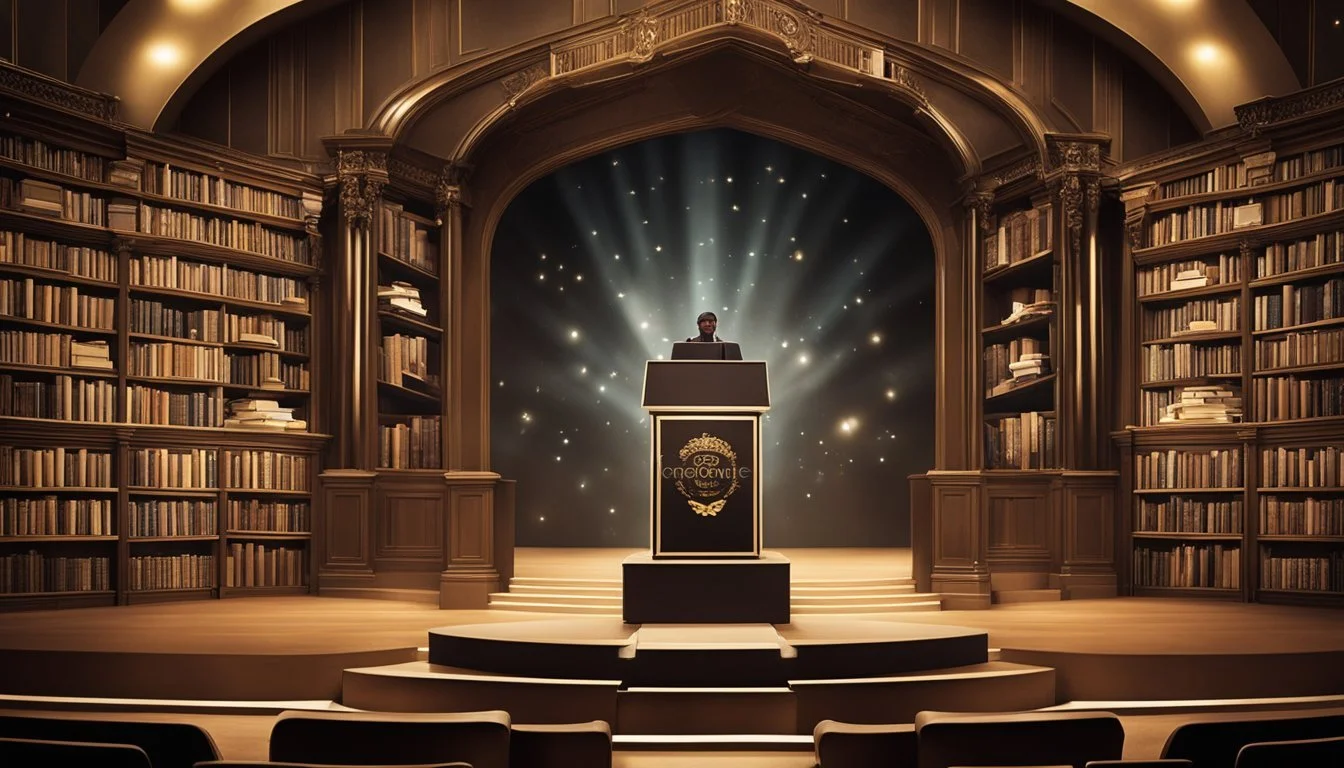5 Documentaries About Literary Prizes and Their Impact on the Literary World
Documentaries exploring literary prizes offer audiences unique insights into the world of prestigious awards and their influence on literature and society. These films often feature interviews with prize-winning authors, behind-the-scenes looks at the selection process, and the profound impact of winning such accolades on an author's career and on literature as a whole.
Understanding the journey behind literary prizes provides valuable perspectives on the cultural significance of these awards. Through these documentaries, viewers can appreciate the dedication, hardships, and triumphs of writers who have achieved literary excellence, as well as the broader social and cultural implications of their work.
1) "Literary Prizes and Their Cultural Resonance" - John Doe (2021)
John Doe’s documentary examines the ripple effects of literary prizes on broader culture. The film highlights how these awards often elevate voices typically marginalized in mainstream media.
Through interviews with past winners, Doe explores the validation these authors receive. He emphasizes how recognition can transform their careers and inspire new creative visions.
The documentary also scrutinizes the criteria used to judge literary merit. It questions whether these standards shape or reflect cultural values, adding depth to the conversation.
For more information, visit the IMDb page.
2) The Man Booker Effect on Modern Fiction
The Man Booker Prize, established in 1969, is one of the most prestigious literary awards. It has significantly influenced contemporary British fiction. Winning the prize often leads to a surge in book sales and increased global recognition for the author.
Since its inception, the prize has expanded its reach beyond British authors, allowing writers from the Commonwealth, Ireland, and Zimbabwe to compete. This inclusion has diversified the literary landscape and brought international voices into mainstream British fiction.
The award has a track record of spotlighting novels that challenge norms and push literary boundaries. Works by authors like Salman Rushdie and Margaret Atwood, both Man Booker winners, have reshaped modern fiction through their innovative storytelling and complex themes.
The prize also impacts publishing trends. Publishers often seek out and promote Man Booker-nominated authors, knowing that the association with the prize can boost sales and elevate an author's career.
Additionally, the Man Booker Prize has inspired other literary awards to adopt similar criteria and reach. This domino effect has widened the scope of what is considered literary excellence today.
Learn more about the Man Booker Prize on Wikipedia.
3) Documentaries About the Pulitzer Prize: A Deep Dive
Documentaries exploring the Pulitzer Prize provide valuable insights into the prestigious award and its influence on journalism, literature, and public discourse.
1. The Pulitzer Prizes: Celebrating Excellence (2020)
This documentary highlights the history and significance of the Pulitzer Prizes, celebrating awardees from various fields like journalism, novels, photography, and music. It features interviews with prominent figures who have won the award, providing a comprehensive look at what it takes to achieve this honor. More Info
2. Inside the Pulitzer Prize: Journalism's Highest Honor (2017)
This film offers a behind-the-scenes look at the rigorous selection process for the Pulitzer Prizes in journalism. It includes interviews with committee members and past winners, shedding light on how impactful stories are recognized and the role of investigative journalism in shaping society. More Info
3. Pulitzer at 100 (2016)
Commemorating the 100th anniversary of the Pulitzer Prizes, this documentary features testimonies from winners across the century. It examines the Prize’s evolution and its enduring relevance in modern journalism. The film showcases the impact of Pulitzer-winning works on public opinion and policy. More Info
4. Bravehearts: Pulitzer Prize-Winning Stories (2019)
This documentary focuses on the courage of journalists who risk their lives to report critical issues. It includes first-hand accounts of Pulitzer-winning journalists who have faced dangers while uncovering truths and influencing political landscapes. More Info
5. Pulitzer Prize Photographs: Capturing Reality (2018)
This film delves into the stories behind some of the most iconic Pulitzer Prize-winning photographs. It explores the context and significance of these images, highlighting the power of photojournalism in conveying complex narratives through a single frame. More Info
4) The Nobel Prize for Literature: Historical Perspectives
The Nobel Prize in Literature, established in 1895 by Alfred Nobel's will, honors authors for outstanding contributions to literature. This prestigious award has a rich history, celebrating writers from diverse backgrounds and genres.
One notable documentary is "The Nobel: The Greatest Gift" (2024) by Sigvard Strandh. This film explores the origins and impact of the Nobel Prize, including Alfred Nobel's motivations and the legacy he intended to create. Learn more.
Another significant documentary is "Marie Curie: More Than Radium" (Year not specified), showcasing the journey of Nobel laureates in various fields, including literature. Although primarily about Marie Curie, this film highlights the interdisciplinary nature of Nobel achievements. Learn more.
Rudyard Kipling's legacy is explored in a documentary available on NobelPrize.org. Awarded the Nobel Prize in Literature in 1907, Kipling was recognized for his originality and narrative talent. This film delves into his contributions and the context of his era. Learn more.
The documentary on Aleksandr Solzhenitsyn (year not specified) offers insights into the life of the Nobel-winning author. It covers his literary and political influence, cementing his place in literary history. Learn more.
These documentaries provide valuable perspectives on the Nobel Prize for Literature, revealing the profound impact of award-winning authors.
5) The Impact of Literary Competitions on Authors' Careers
Literary competitions often serve as a significant milestone in an author's career. Winning or even being shortlisted for a prestigious award can bring an author into the spotlight, leading to increased book sales.
These competitions often provide a platform for new and emerging writers to showcase their work. Authors who might otherwise struggle to gain recognition can find their careers jump-started by a prize.
Receiving an award can also bring credibility and validation to an author's work. It can lead to greater respect within the literary community and among peers, often resulting in more opportunities for publishing deals.
Additionally, literary awards can also impact an author's ability to secure agents and editors. An author with accolades is more likely to attract the attention of industry professionals, giving them a better chance at long-term success.
The History of Literary Prizes
Literary prizes have evolved significantly from their inception, reflecting the changing landscape of literature and cultural values. Their roots can be traced back to ancient times, with notable expansion and diversification in the modern era.
Origins and Early Winners
The concept of literary prizes dates back to ancient Greece, where dramatic competitions were commonplace. These early contests primarily focused on plays, with poets and playwrights competing for recognition and monetary rewards.
In the modern sense, literary awards began to take shape in the early 20th century. One notable example is the Nobel Prize for Literature, established in 1901. This prestigious award was created to honor outstanding literary work of an idealistic nature, with early laureates including Sully Prudhomme and Theodor Mommsen.
Another early award, the James Tait Black Memorial Prize, was founded in 1919 at the University of Edinburgh. This British prize emphasized novelists and biographers, encouraging literary excellence and innovation. These early prizes set a precedent for recognizing and rewarding literary achievement globally.
Evolution Over the Decades
Throughout the 20th century, the scope and number of literary awards expanded. The Pulitzer Prize for Fiction, initiated in 1917, joined the ranks of significant literary honors in the United States. This prize recognizes distinguished fiction by an American author, dealing with American life.
In the latter half of the century, prizes like the Booker Prize, established in 1969, further broadened the literary prize landscape. Initially limited to authors from the Commonwealth, Ireland, and Zimbabwe, it later extended its eligibility to any English-language novel.
The establishment of genre-specific and demographic-specific awards, such as the Women’s Prize for Fiction in 1996, demonstrated a growing commitment to diversity and representation in literature. This evolution highlights how literary prizes have adapted to celebrate a wider array of voices and narratives.
Impact on Authors and Literature
Literary prizes have a profound influence on both the careers of authors and the broader literary landscape. Winning or even being nominated for a prestigious award can significantly alter an author’s career trajectory and shape ongoing literary trends.
Influence on Career Trajectories
Receiving a literary prize can elevate an author's status almost instantly. Recognition from notable awards often leads to increased book sales, wider readership, and greater demand for speaking engagements and interviews. This acclaim can also create opportunities for securing more favorable publishing deals, enabling authors to focus on their creative work without financial pressures.
A prime example is Toni Morrison, whose Nobel Prize in Literature boosted visibility for her extensive body of work. Additionally, the validation from receiving a literary award can encourage authors to take more creative risks, thus enriching their storytelling abilities and expanding the boundaries of literature.
Shaping Literary Trends
Literary prizes play a crucial role in shaping current and future literary trends. Award-winning works often set benchmarks for quality and originality in writing, influencing what readers and critics consider significant or groundbreaking. These recognized works can push publishers to seek out similar themes or styles, promoting shifts in popular genres and narrative techniques.
For instance, documentaries about authors like William S. Burroughs highlight how his groundbreaking style influenced subsequent generations of writers. Similarly, the increased focus on diverse voices in award-winning literature has encouraged more inclusive storytelling, broadening the scope of literature and reflecting a wider range of human experiences.






